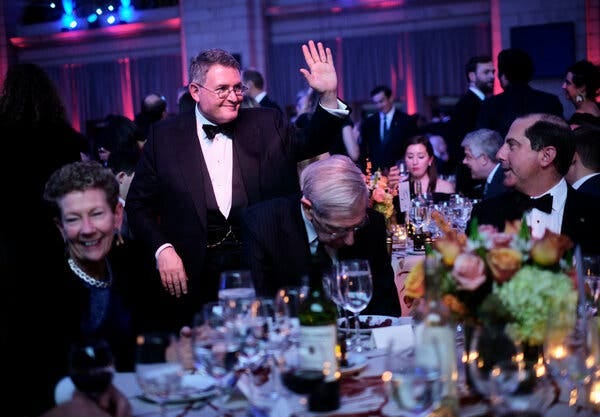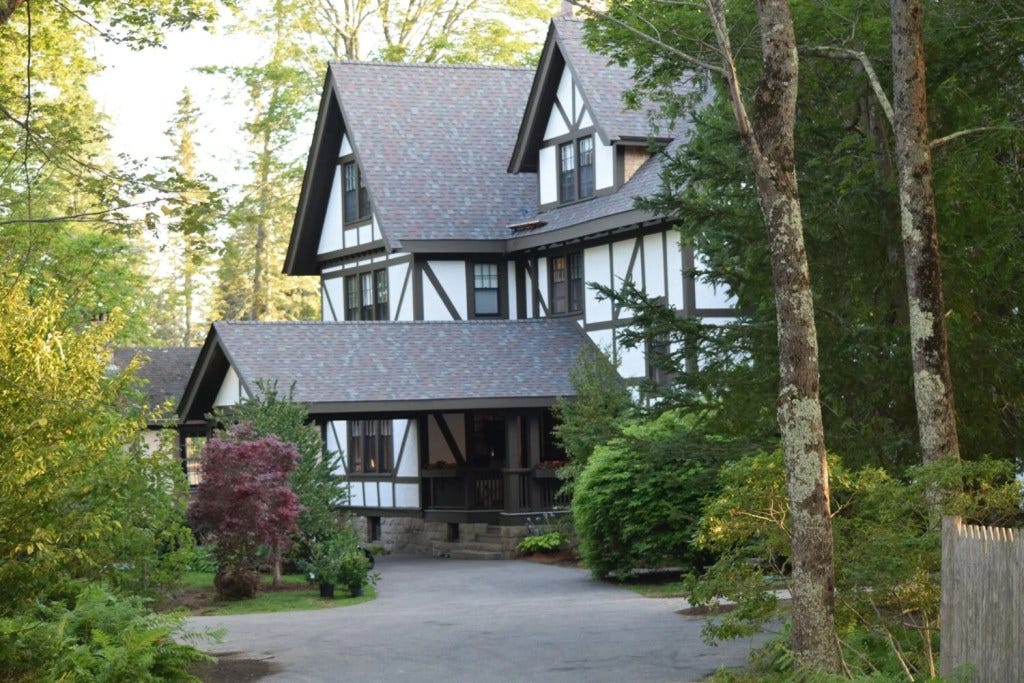Wikidworld (#97)
To have natures is to live within limits. The law itself is about how to know and to navigate these natural limits. Sometimes, maybe usually, the limits are unbearable.
In his 2017 New Yorker article, “The Conservative Pipeline to the Supreme Court,” Jeffrey Toobin emphasized that Leonard Leo’s life “has been shaped as much by Catholicism as by conservatism.” Indeed, there is more than a trace of Cardinal Wolsey stepping out of Hilary Mantel’s Wolf Hall novel in the style and confidence with which Leonard Leo comports himself.
Leonard Leo attends mass daily. As they say, his faith lives large within him. When he speaks, natural law tropes spill forth like overripe avocadoes, as in this recent interview with the Christian conservative think tank, the Institute on Religion and Democracy, about his theology of the judiciary.
There is a rich tradition in the Catholic Church of believing that the institutions that interpret and enforce the civil law are integral to ensuring human dignity, the worth of every person, and, of course, going way back, there was tremendous connectivity between the ecclesiastical traditions of the Catholic Church and the justice systems in countries like England.
In the interview, Leo invokes the term human dignity no fewer than nine times, each instance implicitly a reference to this “tremendous connectivity” between civil justice and ecclesiastical traditions “in countries like England.”
[Perhaps Leo is fondly remembering how “ecclesiastical traditions” informed civil justice during the English Catholic reign of “Bloody” Queen Mary, who in only five years burned at the stake nearly 300 Protestant dissidents.]
This interpenetration of Leo’s traditionalist legal and religious commitments should disabuse anyone of the notion that the natural law moral foundations of Catholicism do not directly inform the jurisprudence of the legal conservative movement.
Leonard Leo was national co-chairman of Catholic outreach for the Republican National Committee and was the 2004 Bush presidential campaign's Catholic strategist. He also is board member and president of the National Catholic Prayer Breakfast, proud member of the Knights of Malta religious order, and 2022 recipient of the John Paul II New Evangelization Award of the Catholic Information Center, the controversial Opus Dei outpost across the street from the White House [not much “public square” symbolism there]. Previous recipients of the John Paul II award include Antonin Scalia and Robby George.
Leo has spent a career shaping the federal judiciary to reflect the rigid, conservative religious dogmas that emerge from his fundamentalist faith. Natural law — in which everything has its “natural” function and its “unnatural” misuse — is the fabric of the universe. According to natural law theory, men and women are “complementary” to one another. Heterosexual marriage is part of the natural order of the universe. Homosexual acts are intrinsically “disordered” and contrary to the natural law. Life begins at conception. Abortion is murder. Because these are pre-political and self-evident truths, derived from God, no rights exist that could countermand them. No room exists for human deliberation and choice.
The natural law and natural rights philosophy “beneath the floorboards” of Federalist Society jurisprudence have in the past three decades supported a “deconstructionist” legal strategy aimed at rolling back the major tenets of U.S. constitutional law since the New Deal. In this period, Federalist Society attorneys and judges have developed, refined, and litigated arguments that significant portions of the New Deal and administrative state are unconstitutional.
They also have asserted that corporations possess rights to freedom of speech and religion no different from individuals. They insist that women and LGBT people are not “protected classes” under constitutional law. And they deny the due process clause of the Constitution implies any right to privacy, which opens the legal gates for banning abortion, contraception, and gay marriage.
Three decades ago, almost no lawyers took these ideas seriously. Today, they have become the litmus tests for nominating conservative judges.
Consider this now-famous quote, also from Jeffrey Toobin’s New Yorker story.
Leo is at ease in the role of impresario. His grandfather was a vice-president of Brooks Brothers, and he instilled in young Leonard a taste for the bella figura. Leo wears tailored suits, often with contrasting waistcoats, and a double-length gold fob attached to a 1935 train conductor’s pocket watch. (“The most accurate watch in the United States until the fifties,” he said.) In lieu of office meetings, Leo prefers to chat over breakfast (just bacon, no eggs) at the Hay-Adams Hotel, across from the White House. As his friend Boyden Gray, the White House counsel under George H. W. Bush, puts it, “He knows the best restaurants in every major city in the world, and the best wines. He has a wide-ranging, inquiring mind, and he can and will talk about any subject under the sun.”
Toobin’s New Yorker profile of Leonard Leo was at the time widely derided and considered a “valentine” (others referred to it as a “blow job”). But the lengthy description of Leo’s Garden of Earthly Delights is revealing of a larger truth about his brand of traditionalist Catholicism, which we’ve alluded to before with Robby George.
Leonard Leo is comfortable with ideas and abstractions — with systematic law, philosophy, and theology. He’s also comfortable with power and influence — with money, leverage, and connections. Above all, he can occupy simultaneously the separate mental spaces in which these realms exist. Like Schrodinger’s superpositioning cat, he is at all times both here and there, simultaneously alive and dead, at once resident in the City of God and the City of Man.
That’s what Leonard Leo can do. And while many serious, committed Catholics are raised to do this, Leonard Leo might do it better than anyone. Some dismiss Leo as a lightweight, but I think that’s a fatal mistake. As with Donald Trump, you have to take very seriously what he’s achieved and how he’s achieved it. Because that is what makes him dangerous.
At the time of Brett Kavanaugh’s Supreme Court nomination, Leonard Leo apparently paid off the mortgage on his home in Virtginia and bought an 8,000 square-foot vacation mansion in the exclusive Mt. Desert Island community of Northeast Harbor, Maine. Leo bought the house — which has 11 bedrooms and 8 bathrooms — for $3.3 million, a million dollar discount from the the appraised value, possibly because the home had previously belonged to the heirs of J. Peter Grace, late (and very long-time) CEO of the chemical company W.R. Grace, devout Catholic, and — crucially — former head of the American Knights of Malta.
[A propos of nothing, W.R. Grace was the subject of massive class-action lawsuits for groundwater-contamination and asbestos-related exposures and deaths in, respectively, Woburn, Massachusetts and Libby, Montana. The Woburn case was chronicled in the best-selling book and John Travolta film, A Civil Action. In response to civil and criminal cases inolving Montana asbestos exposures and deaths, W.R. Grace declared bankruptcy in 2001, from which it emerged 12 years later as a far smaller company.]
Of course, this transaction provoked outrage. But my question is, “what did anyone expect?” At what point does fool me one hundred times, shame on you become an empty shibboleth? The nature of the Catholicism practiced by Leonard Leo (like that of Cardinal Wolsey) is that one can (and should and will) live large in this world and the next.
Cardinal Wolsey acquired a huge fortune in the years from 1515 to 1529. Wolsey’s wealth allowed him to live a lifestyle that to all intents was kingly. Wolsey had a number of homes and his wealth enabled him to purchase Hampton Court and York House (later the Palace of Westminster). Wolsey’s court rivalled that of Henry VIII.
Catholicism is a sensory religion, a religion of the imagination and of the flesh. It is a religion of secrets. For all of these reasons, Catholicism is a religion of contradictions. Of half truths. Or of full truths hollowed out. In Catholicism, there is no such thing as hypocrisy. Because everything is a fiction or a lie.
As I wrote at the beginning of this season of Wikidworld, the history and infrastructure of the Church requires the sins, temptations, and transgressions of the flesh to routinely entice, torment, and afflict us. To seek to live outside these assaults upon our souls is to miss the point of Catholicism. The demonology itself is the point of Catholicism.
Above all, Catholicism is a religion of power. And power most clearly manifests itself when it inhabits, controls, and manages the natural world. Hence the affinity of Thomas Aquinas with the naturalism of Aristotelian philosophy. Hence the forms of the natural law, which are ultimately about how we define our natures as God’s creatures, and what we do with those natures.
To have natures is to live within limits. The law itself is about how to know and to navigate these natural limits. Sometimes, maybe usually, the limits are unbearable. Tomorrow, we’ll begin to examine the three recent Supreme Court cases that redefine these limits in a very Catholic way, by summoning legal fictions that reimagine what it means to have and live in bodies.
Wikidworld. Reimagining Western Civilization.
Season 2: The Catholic Moment
Episode 10: Corpora
Part 2: Hand to God. Hand to Pocket.
Issue#: S2-E10-P2
Date: December 6, 2022




